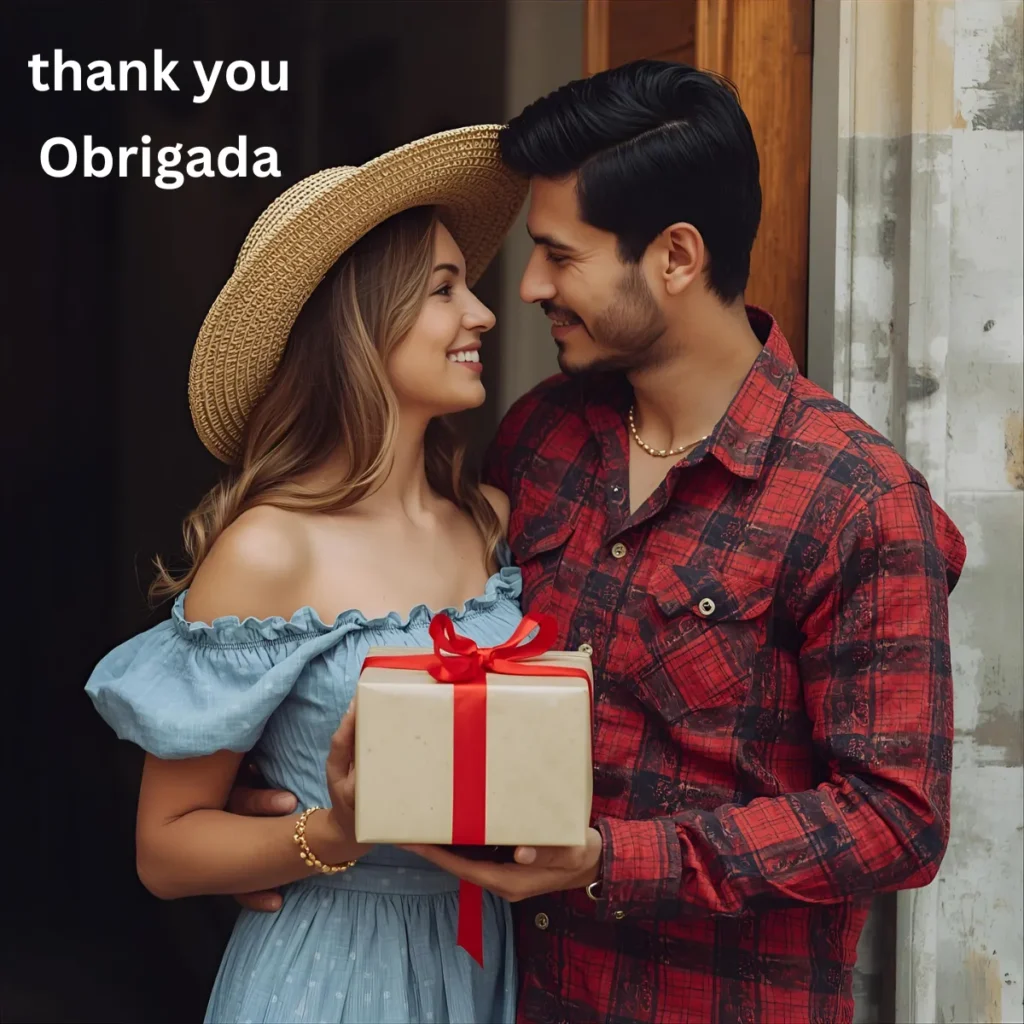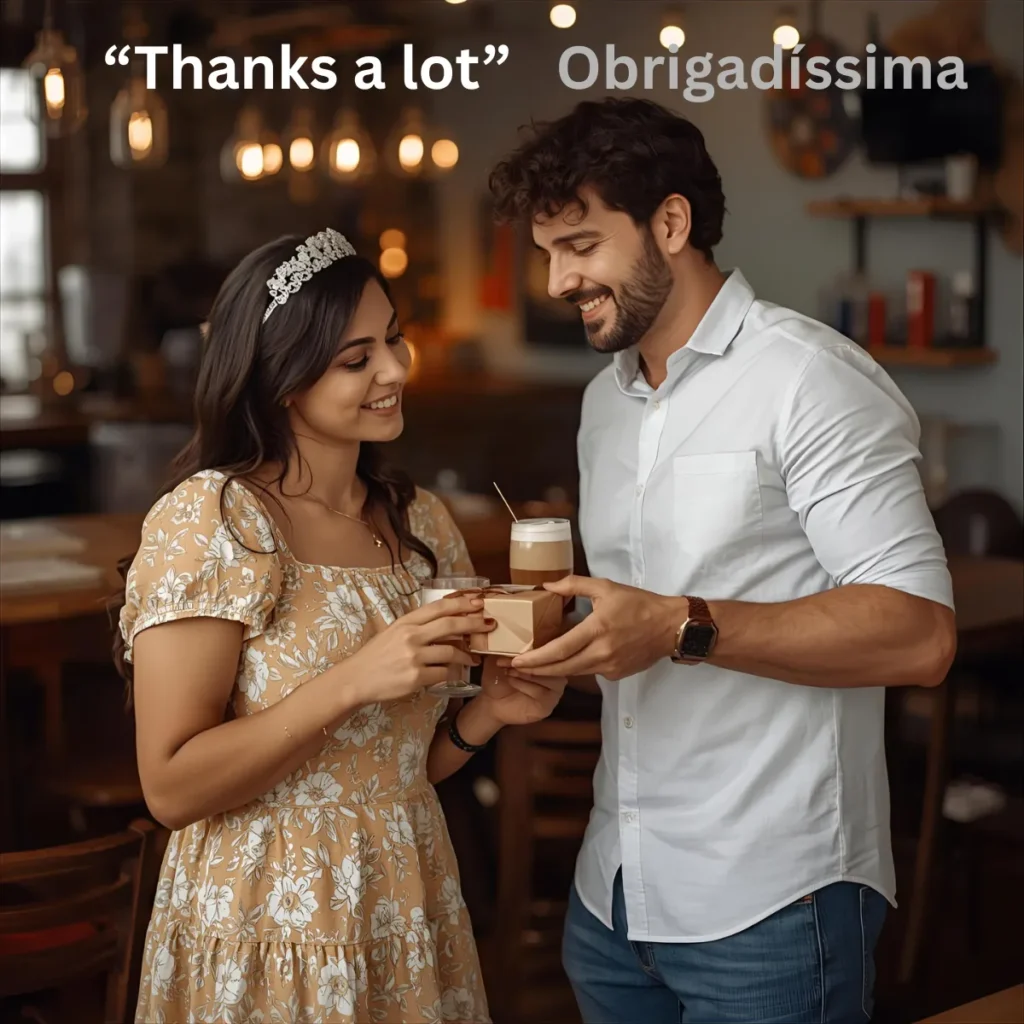Learning how to say thank you in Portuguese is essential for showing politeness and respect when speaking the language. In Portuguese, gratitude is expressed differently depending on gender—men usually say obrigado, while women say obrigada.
Knowing these variations not only helps you sound more natural but also shows cultural awareness and appreciation in conversations.
If you’re wondering how to say thank you in Portuguese to a girl, the correct word is obrigada. And if you want to master how to say thank you in Portuguese pronunciation, focus on saying “oh-bree-GAH-doo/da” clearly and naturally.
Say Thank You in Portuguese
Thank You in Portuguese to a Man
When a man wants to say thank you in Portuguese, the correct word is obrigado, showing gratitude in a polite and natural way.
15 Ways to Say Thank You in Portuguese
| No. | Portuguese Phrase | English Meaning / Usage |
|---|---|---|
| 1 | Obrigado (male) | Thank you (said by men) |
| 2 | Obrigada (female) | Thank you (said by women) |
| 3 | Muito obrigado / obrigada | Thank you very much |
| 4 | Valeu | Thanks (casual, slangy) |
| 5 | Agradecido / agradecida | Grateful (formal, polite) |
| 6 | Obrigadíssimo / obrigadíssima | Thanks a lot (very strong emphasis) |
| 7 | Mil obrigados / obrigadas | A thousand thanks |
| 8 | Gratidão | Gratitude (poetic / emotional thanks) |
| 9 | Obrigado de coração | Thanks from the heart |
| 10 | Muito obrigado mesmo | Thanks a lot indeed |
| 11 | Brigadão | Big thanks (informal) |
| 12 | Agradeço muito | I thank you very much |
| 13 | Muito obrigada pela ajuda | Thank you very much for the help |
| 14 | Obrigado por tudo | Thanks for everything |
| 15 | Valeu mesmo | Thanks a lot (informal emphasis) |
Here are 15 ways to say thank you in Portuguese, complete with example dialogues and a touch of cultural or historical context.
1. Obrigado / Obrigada
(“Thank you” – masculine/feminine)

Origin:
From Latin obligatus, meaning “bound” or “obliged”. Men say obrigado and women say obrigada—because you’re literally saying “I am obliged.”
Example:
👤 User A (female): Obrigada pela ajuda!
👤 User B: De nada! Foi um prazer.
Use: Standard, polite; suitable in nearly all situations.
2. Muito obrigado / Muito obrigada
(“Thank you very much”)
Origin:
“Muito” adds emphasis, meaning “very.” This phrase is widely used when you want to express deeper gratitude.
Example:
👤 User A: Muito obrigada por tudo!
👤 User B: Imagina! Estou aqui para ajudar.
Use: Formal or heartfelt; perfect for sincere thanks.
3. Valeu
(“Thanks” or “Cool” – Brazilian Portuguese)
Origin:
From the verb valer (to be worth). “Valeu” is slang and roughly means “It was worth it” or “Much appreciated.”
Example:
👤 User A: Te trouxe um café.
👤 User B: Valeu! Tava precisando mesmo.
Use: Informal, popular in Brazil.
4. Obrigadíssimo / Obrigadíssima
(“Thanks a lot” or “Thanks a ton”)

Origin:
The suffix -íssimo intensifies the word, making it a stronger version of obrigado/obrigada.
Example:
👤 User A: Te salvei do trânsito!
👤 User B: Obrigadíssimo! Você é demais.
Use: Very appreciative and expressive.
5. Agradecido / Agradecida
(“Grateful”)
Origin:
From agradecer, meaning “to thank.” Commonly used in Portugal.
Example:
👤 User A: Fiz isso por você.
👤 User B: Muito agradecida, de coração.
Use: More poetic or heartfelt; can also sound formal.
6. Grato / Grata
(“Grateful” – formal)
Origin:
Used in written Portuguese or formal speech, especially in business or letters.
Example:
👤 Email sign-off:
Muito grato pela sua atenção.
Atenciosamente, João Silva
Use: Formal, used in emails, speeches, and correspondence.
7. De coração, obrigado(a)
(“Thank you from the heart”)

Origin:
A heartfelt phrase used to emphasize sincerity. Equivalent to “Thank you from the bottom of my heart.”
Example:
👤 User A: Isso salvou meu dia.
👤 User B: De coração, obrigada.
Use: Emotional or serious thank-you.
8. Brigado / Brigada
(Shortened version of “obrigado/obrigada”)
Origin:
A casual, shortened form—just drop the “O.” Common in fast speech and among close friends in Brazil.
Example:
👤 User A: Trouxe um lanche pra você.
👤 User B: Brigado! Você é um anjo.
Use: Informal and relaxed.
9. Muito grato / Muito grata
(“Very grateful”)
Origin:
An elegant way to express deep appreciation. Common in Portugal and formal Brazilian Portuguese.
Example:
👤 User A: Você me ajudou muito.
👤 User B: Muito grato. Conte comigo sempre.
Use: Formal, polite, respectful tone.
10. Mil obrigados / Mil obrigadas
(“A thousand thanks”)
Origin:
Not literally a thousand thanks, but an expressive phrase used to show extreme gratitude.
Example:
👤 User A: Te salvei de uma multa!
👤 User B: Mil obrigados! Você me salvou.
Use: Very enthusiastic or playful.
11. Obrigado de verdade / Obrigada de verdade
(“Truly thank you”)

Origin:
Adds emotional weight. “De verdade” means “for real” or “genuinely.”
Example:
👤 User A: Não precisava, mesmo!
👤 User B: Obrigada de verdade. Você fez meu dia.
Use: Honest, sincere; often with emotion.
12. Tamo junto, valeu!
(“We’re in this together, thanks!” – slang)
Origin:
A street-style expression from Brazil, used among friends and teammates. “Tamo junto” = “We’re together” or “We got each other’s back.”
Example:
👤 User A: Te ajudei com o trampo.
👤 User B: Tamo junto, valeu!
Use: Very informal; close bonds.
13. Sou muito grato(a)
(“I am very grateful”)
Origin:
A full sentence expressing personal gratitude. It’s humble, polite, and heartfelt.
Example:
👤 User A: Te devo uma.
👤 User B: Sou muito grato por tudo.
Use: Formal or serious tone.
14. Agradeço demais
(“I really appreciate it”)
Origin:
From agradecer (to thank) + demais (too much/very much). Common in spoken Brazilian Portuguese.
Example:
👤 User A: Entreguei antes do prazo.
👤 User B: Agradeço demais, viu?
Use: Informal and friendly.
15. Foi uma gentileza, obrigado(a)
(“That was kind of you, thank you”)
Origin:
Used to highlight someone’s kindness or courtesy before expressing gratitude.
Example:
👤 User A: Trouxe um presente pra você.
👤 User B: Foi uma gentileza, obrigada!
Use: Formal and polite; great for social niceties.
Conclusion:
Mastering how to say thank you in Portuguese is more than just learning words—it’s about expressing respect and gratitude naturally. Whether you say obrigado as a man or obrigada as a woman, using the right form shows cultural awareness. From polite to casual settings, knowing these expressions helps you connect more warmly and confidently in Portuguese conversations.

Liam Bennett is a dedicated content writer who creates clear, engaging, and well-structured articles.
He focuses on delivering practical information that is easy for readers to understand and apply.
Liam Bennett currently writes high-quality content for repliesnest.com, ensuring clarity and reliability.



